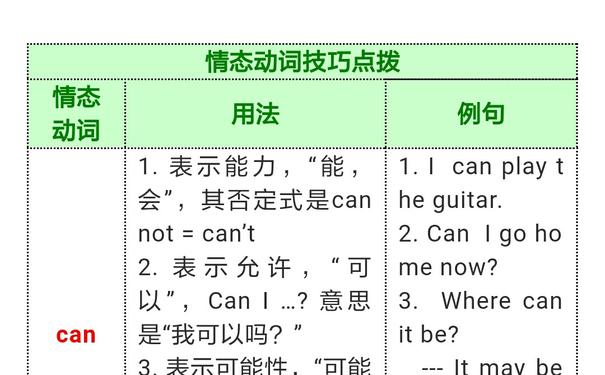一、情态动词加动词构成句子?
a. may /might /have done
1.表示对过去事实不大肯定的推测,常译为“可能已经”。
they might have taken a later train. 也许他们乘坐的是晚一点儿的火车。
he seems to know the city quite well. he may have been there before. 他似乎对那个城市很熟悉,他以前可能去过那儿。
2.表示“本来应该或可以做但没有做某事”,含有轻微的责备口吻或遗憾。
you might have given him more help, though you were busy. 你本来应该给他更多的帮助,虽然你很忙。
the proposal might have been refused. 这个建议本该拒绝的。
b. cancould have done
1.表示对过去事实的推测,常用于否定句和疑问句。
he can't couldn't have watched tv yesterday for he knew they would have an exam. 昨天他不可能看电视,因为他知道快要考试了。
i don't know why she didn't call me yesterday. can (could) she have forgotten my telephone number 我不知道昨天她为什么没给我打电话,难道她会把我的电话号码忘了吗?
he didn't come to school yesterday. can he have been ill 他昨天没来学校,难道他生病了?
2.could可表示对过去能做而未做的事感到惋惜、遗憾,可译成“本来是可以……的”。
why didn't sophie apply for the job she could have got it. 为什么索菲不申请这项工作?她本来是能得到的。
why did you stay at a hotel when you went to new york you could have stayed with barbara.你到纽约时为什么住宾馆?你完全可以和芭芭拉住在一起的。
given more time, we could have done the work better. 如果给我们更多的时间,我们完全可以把这项工作干得更好。
二、包含情态动词的句子或祈使句 英语作文?
①
l need time to exercise regularly as can not walk fast easily.I could play
basketball whenIwas at school.Bu
now l may not have the energy to
run for catching the bus foravoiding work late.So lthink l mustsqueeze enough time to take part insports activities to build up a goodbody .Ibelieve lwill be whatlusedto be,healthy and strong
②
情态动词用在行为动词前,用来表示能力、允许、许诺、可能、必须、劝告、意愿等概念和态度。常见的情态动词有: can (could), may (might), must, need, ought to, dare (dared), shall (should), will (would)。
例如:
Can you sing English songs? 你会唱英语歌吗?
Shall we begin now?我们现在就开始吗?
You must obey the school rules.你必须遵守校规。
You can’t smoke here.你不能在这里吸烟。
He had to leave.他不得不离开。
Let us go,will you?让我们去吧,行吗?
三、主谓宾加情态动词的句子?
1.we keep the classroom clean.
2.I give him a thousand dollar
3.I kept the room warm.
4.I'm going to paint the desk pink.
l can speak English.
He can make cakes.
四、情态动词开头的句子是什么?
情态动词开头的句子是一般疑问句,回答用Yes或No。
情态动词引导的一般疑问句结构通常为:情态动词+主语+动词原形+其他?
答语为:Yes,主语+can./No,主语+can't.
举几个例子:
①—Can you sing?你会唱歌吗?
—Yes, I can./ No, I can't.是的,我会。/不,我不会。
②—Can she/he speak English?
她/他会说英语吗?
— Yes, she/he can. / No,she/he can't.
英语句子中 以情态动词开头的句子是一般疑问句
③
Can you speak English?
五、情态动词的主动语态例句?
情态动词的主动语态是:
情态动词+动词原形,例如:
He can sing and dance.
You must follow the rules.
May I come in?
六、过情态动词的英语句子?
He could not speak English. I thought you might need the book, so I took it here. He would be here if he came back tongiht. She dared not go out alone at night.

